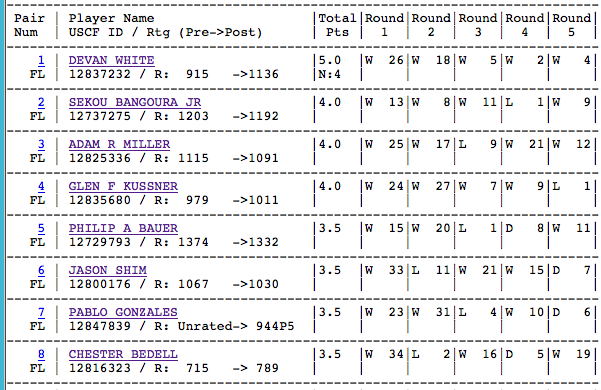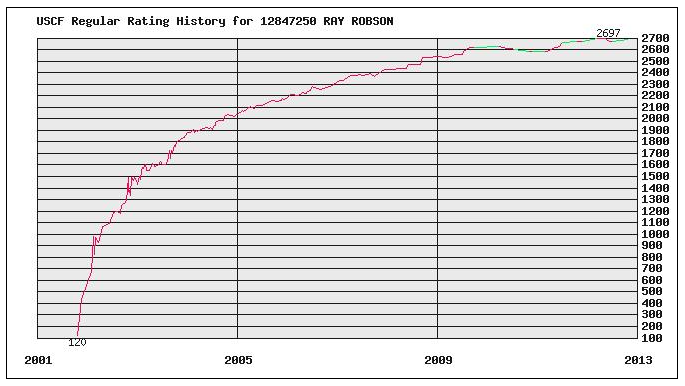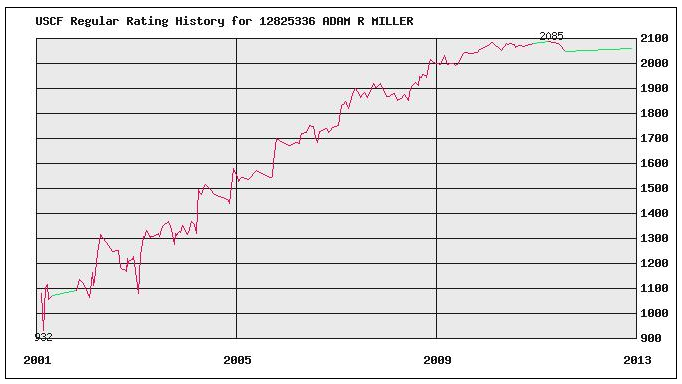Consider this:
A little kid walks into a scholastic chess tournament in St. Petersburg one day. He’s unrated, so he probably plays on one of the bottom boards. He loses two games and then goes home. According to the tournament report he finished second-to-last, tying with two other kids who also withdrew after two losses. He earned an official USCF rating of 120.
Neither of the other two kids he tied with were ever heard from again (at least in U.S. chess). However, for some reason this kid kept playing. A month later he came back and played in another beginner tournament. This time he scored 4 points out of 5, losing only to a 435 player, and increased his rating to 438. Ray Robson was on his way.
It’s amazing to me to think that if Robson had quit after that first tournament — something that was very possible, that most scholastic players would have done in his shoes — then American chess history would be different. He is now a grandmaster, and the 13th highest-rated player in the U.S. He is surely a future U.S. champion, assuming that he keeps playing.
When I go to tournaments with lots of kids running around, I confess that they get on my nerves sometimes. They make so much noise, there are so many of them, and I know that 90 percent of them will quit in a few months or years.
But Robson’s history is a good reminder that every child matters and every game matters. See that player on board 146 in the beginner’s section, the one who is barely tall enough to see over his pieces? Take a good look, because one day you might see him on board 1 in the national championship.
Anyway, I thought you all might find it interesting to see a little slice of history, as it occurred in October 2001 in St. Petersburg, Florida.
It’s equally mind-blowing, to me, to take a look at Robson’s rating progress since that first tournament:
I strongly suspect that Robson owns the all-time U.S. record for largest lifetime rating improvement. His lifetime improvement of 2577 is almost unbeatable (for anybody except him) because I don’t think you can get a published rating below 100, and it’s extremely hard to get a rating over 2700. To break Robson’s record, Hikaru Nakamura would have to attain a rating of 3262. Samuel Sevian would have to reach 2894. I would have to get to 3804. 😎
By the way, you might wonder what became of the other 34 children who played in Robson’s first tournament. I clicked on every one of them. It turns out that two of them are still active in tournament chess: the third-place and fifth-place finishers, Adam Miller and Philip Bauer. Of the two, Adam Miller has been a little bit more successful. He tied for fifth place earlier this month at the national K-12 championship, in the 12th-grade section. His rating history is also pretty impressive:
This is pretty darned good. He basically improved in a straight line for almost ten years before he hit a ceiling at 2100. If you looked at this graph, you would say this kid was a prodigy. And yet Robson just blows him away!
It kind of puts things into perspective. There’s talent, which almost every kid has and blossoms with a little bit of encouragement and patience, if you can just keep them from quitting. And then there’s TALENT, which is mysterious and ineffable and rare.








{ 8 comments… read them below or add one }
“It kind of puts things into perspective. There’s talent, which almost every kid has and blossoms with a little bit of encouragement and patience, if you can just keep them from quitting. And then there’s TALENT, which is mysterious and ineffable and rare.”
Dana, what do you think of books such as “Talent Is Overrated” by Geoff Colvin and “Outliers” by Malcolm Gladwell, which argue otherwise?
There is also Anders Ericsson who argues that 10,000 hours of “deliberate practice” are necessary to achieve mastery in any field.
I’m glad you asked! I’ve actually argued the other side of this in the past — a lot of times people throw around the word “genius” when it isn’t justified.
But when you look at Ray Robson and Adam Miller, I imagine that they started at more or less the same beginning level. They started in the same year, 2001. They have played in the same number of tournaments (Robson, 208; Miller, 210). I don’t know how much study time they put in, but I’ll bet that Robson didn’t study twice as much. And yet Miller improved by about 100 points a year, while Robson improved by 200 points a year, or more. How would Colvin, Gladwell, or Ericsson account for this?
I do agree with Ericsson to some extent: 10,000 hours of deliberate practice (at a young enough age) will probably get you to national master in chess. For people like Miller and people like me, achieving that level of success basically comes from not giving up.
But 10,000 hours of practice got Robson way past national master — it made him one of the top 13 players in the whole country!
I haven’t read Gladwell’s book, so I can’t really respond to it. As I said, the word “genius” gets overused a whole lot in our society, so I am sure that it is very easy to write a book about supposed outliers that really aren’t. Perhaps that is what Gladwell has done. But now and then, you find outliers that really are. And we still don’t know enough about talent to explain why Ray Robson turned out to be an outlier, and Adam Miller didn’t.
Incidentally, my viewpoint on this has also perhaps been influenced by the summers I spent teaching at the Talent Identification Program at Duke University. The founder of the program, Robert Sawyer, strongly believed the rather unfashionable notion (in education circles) that there really are kids of superior talent. He also believed that you could find them by giving kids the SAT test at a very young age (7th grade) and looking for outliers. I’m agnostic about the idea of detecting talent with the SAT test, but I spent enough time at TIP to believe in the existence of talent. And what I also believe in, very very strongly, is that talented kids are poorly served by an educational system that tries to deny their existence and that caters only to the average student. TIP was all about giving these kids a richer experience.
Does this answer your question? Thanks for referring me to those books, because I really should read them.
Thanks Dana for the extended response.
It would be helpful if you could post a full blog post perhaps about the role of talent in chess and perhaps math as well.
By the way, for the purposes of this discussion, by ‘talent’, I mean something inherent in the individual – something the individual was born with – something most likely rooted in biology.
Intuitively, the notion of talent makes sense to me but there are scholars who argue otherwise – so I’m a little undecided – agnostic perhaps. Likely, these scholars/writers get an over-emphasis in the popular culture because the public like the self-help message.
Here I’m linkink to a famous paper by Anders Ericsson:
http://projects.ict.usc.edu/itw/gel/EricssonDeliberatePracticePR93.pdf
Since you don’t believe in talent, I’d like to play the devil’s advocate and ask you the following:
What do you think of Polgar sisters? Their parents explicitly wanted to show that ‘genius’ performance was possible through sheer hard-work. Polgar sisters weren’t chosen specially. They weren’t selected through an SAT test.
You may say that ‘well Judith performs so much better than the other two – that shows that she’s more talented.’ True, but then talent-skeptics reply that Judith is more hard-working than the rest.
As for Ray Robson and the other guy you are comparing him to… We know that Ray Robson dedicated his whole life to chess. (You can find this in his Chess Life interviews.) We don’t know how much work the other guy put in. It’s likely
Ray Robson spent more than twice the amount the other guy spent.
(Again, I’m just playing the devil’s advocate. I don’t necessarily agree.)
Hi Anlam,
There’s a little bit of a typo in your reply… I wrote “I spent enough time at TIP to believe in the existence of talent,” which somehow became in your message “Since you don’t believe in talent, …” However, I think you just accidentally typed the wrong thing.
There’s no question that it’s hard to separate talent from a lot of other things — motivation, resources, coaching / teaching. If only we could do a controlled experiment, but that will never be possible.
I find the comparison between Ray Robson and Adam Miller to be interesting precisely because so much was similar between them — same age, same region of the country, even the same number of tournaments, which might be a reasonable proxy for the amount of effort they have put into chess. And yet, their results have been very different.
Unfortunately I don’t know Adam Miller, or else we could ask him how much he studied chess!
There’s an interesting point in the movie “Brooklyn Castle” where Rochelle Ballantyne talks about a boy who is younger than her but already has a higher rating. “I guess he just works harder than me,” she says.
I felt at that moment that she was repeating a message that she has heard from adult talent-deniers. I felt quite conflicted about this. On the one hand, you don’t want to discourage her by saying, “Well, maybe that boy is just more talented than you.” On the other hand, you don’t want her to start blaming herself for not working hard enough when it’s simply not true.
But kids are very good at seeing through adults’ half-truths. I think I would tell Rochelle this: it’s possible that the other kid has more talent, but there are a lot of other possibilities too. Maybe he has a better home situation, better teaching, etc. You can’t control any of that, but the one thing you can control is giving the best effort that you can. And many times, a little more effort DOES beat a little more talent. So don’t give up.
Perhaps a more thorough data analysis of Adam Vs Ray could reveal interesting insight.
I think there is valuable information in rating and tournament frequency data which might help researchers answer some interesting question. For instance, I received the following information from USCF when I tried and failed to get access to some rating data.
“For example, we know that it takes about
three tournaments for a young player’s rating to start to show signs of
stability, and most players start to show signs of improvement after about
five events.
Thus five is sort of the ‘magic number’ in terms of membership retention. Once
a young player has been to five tournaments, there’s a much better chance he or
she will continue going to tournaments and remain a USCF member.”
Could the data reveal something useful about outliers like Ray that we don’t already know by reading Robson’s Chess Child?
“I also believe in, very very strongly, is that talented kids are poorly served by an educational system that tries to deny their existence and that caters only to the average student. ” As a former math teacher, I absolutely agree with you on this, . The system is set up to prevent catering to the above average which I think is tragic.
Couple of other books that argue for “deliberate practice” :
Sudden Genius: The Gradual Path to Creative Breakthroughs by Andrew Robinson
The Talent Code: Greatness Isn’t Born. It’s Grown. Here’s How
I remember seeing Ray Robson at the 2007 Amateur Team West. He was playing on the table next to ours. I recall how inquisitive he seemed, how he kept coming over to look at our games and the games of teams around him. Even though it was almost six years ago he was already considerably stronger than anyone on our team (I think our board 1 was 2100 and Ray was already over 2300 by this point), yet he didn’t mind looking at the games of lower rated players. He seemed to absorb games/information like a sponge, surely a positive trait in one so young and on his way to becoming a GM. Perhaps more impressive is that Ray actually lived in Florida at the time and this was a tournament in Southern California!
My eye scanned “St. Petersburg” in the first sentence and I automatically assumed you were talking about Talb, or someone like that. (Okay, I should have remembered that Talb was from Riga. Korchnoi, then.)
I just happened to stumble across this post today, and I figure it would help to clear up some of the speculation. Ray and I were actually pretty good friends for the first few years going to the same tournaments etc. until he moved onto bigger tournaments and I quit chess after the 2012 national tournament. As for our study habits, as you said, Ray spent his life studying, while I honestly didn’t really study at all. I had some coaching from different people along the way, but I mostly coasted on talent for my entire time. I hit a peak of about 1900 where I needed coaching to get me over, but aside from that, I took very little time. Let me know if I can clear up anything else!
Sincerely, Adam Miller